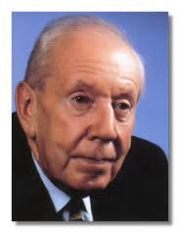Sir Malcolm Arnold
Born in Northampton in 1921, Malcolm Arnold is one of the towering figures of the 20th century, with a remarkable catalogue of major concert works to his credit, including nine symphonies, seven ballets, two operas, one musical, over twenty concertos, two string quartets, and music for brass-band and wind-band. He also wrote132 film scores, among these are some of the finest works ever composed for the medium including Bridge on the River Kwai (for which, in 1958, he was one of the first British composers ever to win an Oscar), Inn of the Sixth Happiness (for which he received an Ivor Novello Award in 1958), Hobson’s Choice and Whistle Down the Wind.
Arnold began his professional musical life in July 1941 as second trumpet with the London Philharmonic Orchestra. Acknowledged as one of the finest players of the day, he eventually became the orchestra’s Principal Trumpet. By the end of the 1940s he was concentrating entirely on composition. The long and close relationship established between Malcolm Arnold and the LPO continues unabated, with the orchestra performing and recording the composer’s music widely.
Throughout his life Malcolm Arnold has maintained a strongly held social conscience. In May 1957, as a guest of the Union of Czechoslovak Composers, he represented the British Musicians Union at the Prague Spring Festival. It was at this time that Arnold first met Shostakovich. To mark the Centenary of the Trades Union Congress, he was commissioned to write the Peterloo Overture; a work premiered by the Royal Philharmonic Orchestra at the Festival Hall on 7 June 1968.
Sir Malcolm Arnold died on 23 September 2006














 My Wish List
My Wish List















